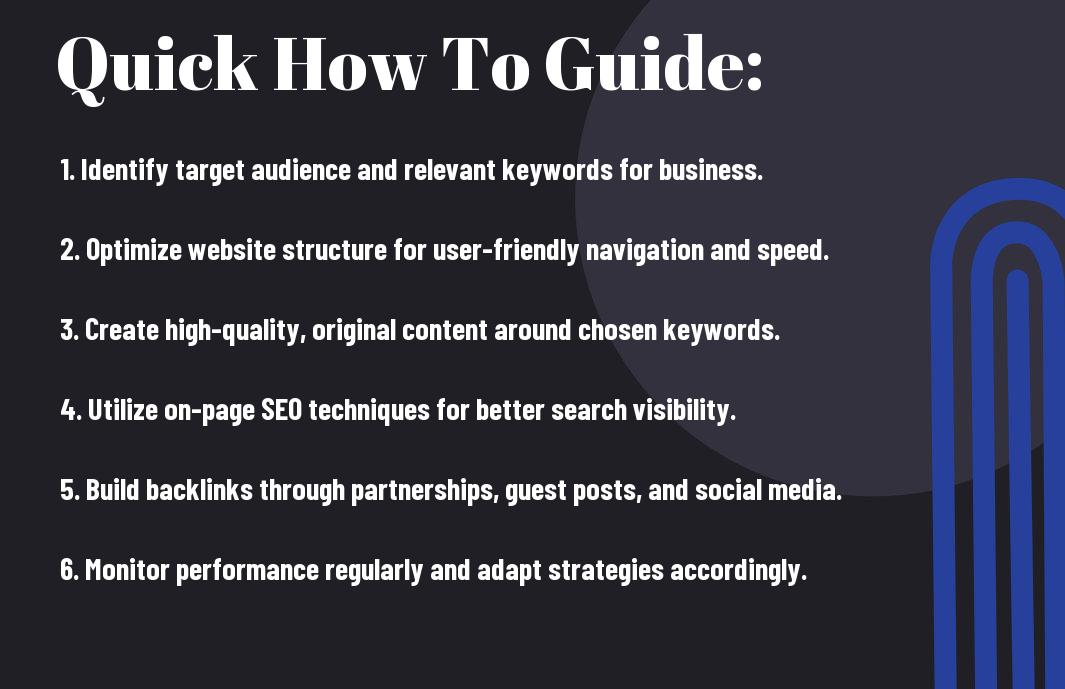This guide will empower you to boost your small business’s visibility online through effective Search Engine Optimization (SEO) techniques. By implementing the strategies outlined here, you can attract more customers to your website and establish a stronger online presence. SEO is not just about using keywords; it’s about creating valuable content, optimizing your website structure, and understanding user intent. Get ready to enhance your digital footprint and drive sustainable growth for your business!
Key Takeaways:
- Prioritize keyword research to identify relevant terms that potential customers are using to find your products or services, allowing you to tailor your content effectively.
- Optimize your website’s structure and on-page elements such as titles, meta descriptions, and headings to enhance search engine visibility and improve user experience.
- Leverage local SEO strategies, including Google My Business optimization and local citations, to attract customers in your area and boost your online presence.

Understanding SEO
A comprehensive understanding of SEO is vital for small businesses aiming to enhance their online visibility. SEO, or search engine optimization, involves various strategies and techniques that help your website rank higher in search engine results. By optimizing your content and website architecture, you can attract more organic traffic, engage potential customers effectively, and establish your brand as a credible authority in your niche.
What is SEO?
Even though SEO might seem complex, it simply refers to the process of improving your website’s visibility on search engines like Google. By implementing specific strategies such as keyword optimization, link building, and content creation, you can significantly boost your site’s ranking, making it easier for potential customers to find your products or services.
Why SEO is Important for Small Businesses
Assuming you want to compete effectively in your market, investing in SEO can offer substantial benefits for your small business. It enhances your visibility, drives targeted traffic and helps you connect with users actively searching for what you offer.
A strong SEO strategy aligns with your business goals and can lead to increased brand awareness and higher conversion rates. Leveraging SEO not only drives traffic to your website but also facilitates trust and credibility among consumers. If you’re not visible in search results, you risk losing potential customers to competitors who are optimized. By harnessing SEO effectively, you can position your small business to thrive in a competitive landscape.
How-To Get Started with SEO
There’s no better time to enhance your business’s visibility online than now. Getting started with SEO may seem daunting, but by breaking it down into manageable steps, you can significantly improve your website’s performance in search engine results. Focus on conducting thorough keyword research, optimizing your website structure, and creating quality content that resonates with your audience. With a solid plan in place, you’ll be on your way to maximizing your online presence.
Conducting Keyword Research
One of the first steps in your SEO journey is conducting keyword research. This process involves identifying the specific terms and phrases that potential customers are using to search for your products or services. Utilize tools like Google Keyword Planner or SEMrush to find high-traffic keywords that relate to your business. Focus on words that have strong search volume but are not overly competitive; this will give you a better chance of ranking higher in search results.
Setting Up Your Website for SEO
One key element in achieving effective SEO is setting up your website properly. An organized, user-friendly structure is vital for both visitors and search engines. Ensure your website is mobile-friendly, loads quickly, and has clear navigation. Implementing best practices, such as using descriptive URLs and header tags, will enhance your site’s SEO performance.
A well-structured website sets the stage for strong SEO performance. Optimize your site’s loading speed and ensure it is mobile-responsive to reach a wider audience. Use descriptive URLs and informative header tags to improve both user experience and search engine crawling. By establishing strong foundations, you create a positive environment for higher search rankings and enhance your visitors’ interactions.
On-Page SEO Tips
Not focusing on on-page SEO can hinder your website’s visibility. To fully optimize your pages, consider the following vital tips:
- Incorporate target keywords naturally throughout your content.
- Use header tags effectively to structure your content.
- Enhance images with alt text that includes relevant keywords.
- Optimize your meta descriptions for higher click-through rates.
- Ensure your URLs are clean and incorporate keywords.
After implementing these strategies, you’ll see improved search engine rankings.
Optimizing Content
To create compelling content, utilize your target keywords in a way that flows naturally. Aim for high-quality, informative articles that provide real value to your audience. Engaging content not only boosts your SEO but also establishes your brand as an authority in your industry.
Improving User Experience
For enhancing your website’s user experience, prioritize site speed and mobile responsiveness. A seamless browsing experience encourages visitors to stay longer, which can lower your bounce rate.
Content layout plays a significant role in user experience. Clear navigation helps visitors find information easily, while legible fonts and appropriate colors contribute to a pleasant aesthetic. Incorporating calls-to-action effectively guides users toward desired actions, increasing engagement and conversions. Ensure your site is optimized for mobile users, as a majority of traffic comes from mobile devices. A smooth user experience not only keeps visitors coming back but also positively impacts your search rankings.
Off-Page SEO Factors
To enhance your website’s visibility, focus on off-page SEO factors that help build your online reputation and authority. Key elements include:
- Backlinks from reputable sites
- Social media engagement
- Online reviews and testimonials
- Guest blogging
- Influencer collaborations
Knowing how to leverage these components effectively can significantly boost your search engine ranking.
Building Quality Backlinks
Factors such as relevance, authority, and diversity of backlinks are vital for improving your site’s ranking. Aim for links from established websites in your industry and consider guest posting or collaborations to acquire these valuable connections.
Leveraging Social Media
An effective strategy to enhance your online presence involves tapping into social media platforms. Consistent and engaging content can drive traffic back to your site, fostering relationships with your audience.
Building a strong social media presence starts by choosing the right platforms for your target audience and sharing valuable content. Engaging regularly encourages increased visibility and can lead to viral sharing, promoting your brand organically. Moreover, be cautious of negative interactions or spammy tactics that can harm your reputation. Instead, focus on authentic engagement to cultivate a loyal community around your brand.
Monitoring and Analyzing SEO Performance
Many small business owners overlook the importance of monitoring and analyzing their SEO performance. Regularly assessing your online presence allows you to identify what strategies are working, where improvements are needed, and how to stay ahead of competitors. Understanding your performance metrics can lead to informed decisions that enhance your visibility and attract more customers.
Using SEO Tools
Performance analysis begins with effective SEO tools that provide insights into your website’s metrics. Utilizing tools like Google Analytics, SEMrush, or Ahrefs allows you to track keyword rankings, traffic sources, and user behavior on your site. These platforms can show you what’s resonating with your audience and highlight areas that require attention.
Analyzing Metrics and Adjusting Strategies
Metrics gathered from your SEO tools are key to refining your strategies. Regularly reviewing data such as organic search traffic, bounce rates, and conversion rates enables you to make informed adjustments. If certain keywords are underperforming, consider revising your content or optimizing your website for better engagement.
Monitoring your site’s performance should be an ongoing process that creates a dynamic approach to your SEO strategy. By analyzing significant metrics, you can quickly identify trends and make necessary adjustments to stay aligned with your goals. Focusing on changes that yield positive results will cultivate your online presence and enhance your overall business success.
Ongoing SEO Strategies
Unlike a one-time campaign, ongoing SEO strategies are crucial for small businesses seeking sustained online visibility. Continuously optimizing your website and adapting to changes in search engine algorithms will help you stay competitive. Engaging with your audience through various platforms and strategies will keep your brand relevant, ensuring you don’t miss out on potential customers.
Keeping Up with SEO Trends
On the ever-evolving landscape of digital marketing, staying abreast of SEO trends is vital for your business’s online presence. Emerging technologies, algorithm updates, and changing user behaviors can drastically affect your search engine rankings. Regularly dedicating time to research and implement new strategies will keep your website aligned with best practices and user expectations.
Regular Content Updates
One of the most effective ongoing SEO strategies you can employ is creating and refreshing your content regularly. This not only enhances user engagement but also signals to search engines that your site is active and relevant.
Keeping your content fresh is crucial for maintaining user interest and achieving higher search rankings. Regularly updating your blog posts or product descriptions not only improves your website’s credibility but also encourages returning visitors. Consider incorporating new industry insights, relevant keywords, and multimedia elements to enhance user experience. Prioritize content quality while ensuring that you address evolving user needs and algorithm changes. This ongoing practice significantly contributes to your overall online visibility and success.
Summing up
The key to maximizing your online presence with SEO involves a strategic approach tailored to your small business. By implementing best practices such as keyword research, quality content creation, and effective link-building, you can significantly enhance your visibility. You should continuously analyze your performance and adapt your strategies to stay ahead in the digital landscape. By prioritizing SEO, you position your business for growth and better reach your target audience, ultimately driving more traffic and conversions.
FAQ
Q: What are the basic steps to optimize my small business website for SEO?
A: To optimize your small business website for SEO, start by conducting keyword research to identify relevant terms your target audience is searching for. Next, incorporate these keywords naturally into your website content, including titles, headings, and meta descriptions. Additionally, ensure your website is mobile-friendly and loads quickly. Creating high-quality, engaging content like blogs or articles can also attract visitors. Finally, build backlinks from reputable websites to increase your authority and visibility in search engine results.
Q: How do I utilize social media to enhance my SEO efforts?
A: Social media can play a significant role in enhancing your SEO efforts. Begin by sharing high-quality content from your website on your social media platforms to drive traffic back to your site. Engage with your audience through comments and messages to build a community around your brand. Utilizing relevant hashtags can increase the reach of your posts. Additionally, having a strong social media presence can improve brand awareness and potentially lead to backlinks when others share your content, which ultimately supports your SEO goals.
Q: How can I measure the effectiveness of my SEO strategies?
A: To measure the effectiveness of your SEO strategies, start by using tools like Google Analytics and Google Search Console to track your website’s performance. Monitor key metrics such as organic traffic, bounce rate, and conversion rates over time. Pay attention to keyword rankings to see if you are moving up in search engine results. Additionally, review the number of backlinks and social shares your content receives, as these can indicate the level of engagement and authority your site is gaining. Adjust your strategies based on the data collected to ensure continuous improvement.




